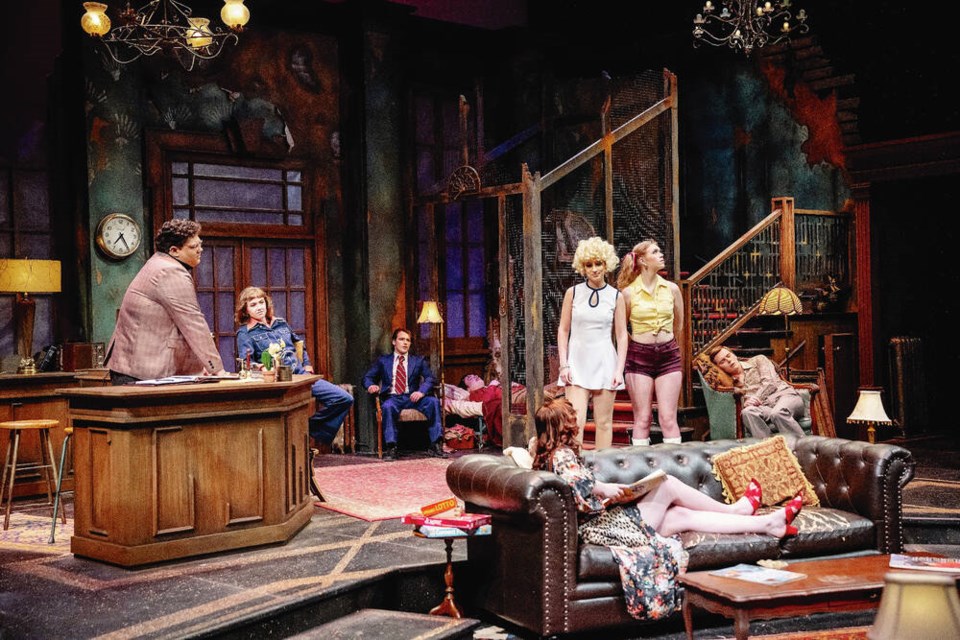Sometimes in theatre everything somehow comes together: the acting, the direction, the set, the costumes. Such rare occasions can be invigorating and are often thrilling.
And so it is with the University of Victoria’s impressive revival of Lanford Wilson’s The Hot L Baltimore, now playing at the Phoenix Theatre. Well directed by faculty member Peter McGuire, this is a superior theatre department production not to be missed.
Some may remember Wilson for his Pulitzer-Prize winning play Talley’s Folly (1980). The Hot L Baltimore was a 1973 breakthrough success for the American playwright. It’s set in a once-grand hotel, now a flophouse, on the verge of demolition. The action happens in a disintegrating lobby where a motley gang of outcasts (sex workers, johns, hustlers, other assorted misfits) gossip, complain, exchange insults and, once in a while, treat one another like family.
Wilson’s comedy-drama delves into a low-rent netherworld in the tradition of John Patrick Shanley, Sam Shepard — with perhaps a rosy dollop of Tennessee Williams nostalgia stirred in. The playwright has genuine empathy and respect for his characters; a trio of sex workers, for instance, are portrayed affectionately and without judgement.
While Wilson offers the gritty real deal there’s a taste of sentimentality at work too — like a hot cup of Hieronymous Bosch sweetened with a teaspoon of honey.
The Hot L Baltimore is a challenging choice for a student production. For one thing, with 15 characters, it’s a large ensemble cast — always a challenge. There’s precious little in the way of plot. And Wilson favours over-lapping dialogue, which is a tricky to do well (the show’s sometimes like a noisy party where everyone talks loudly over one another).
In short, it’s potentially difficult terrain to navigate. Yet a talented student cast pulled it off Thursday night with an assured aplomb any professional troupe might envy.
Aside from solid acting, scrupulous attention to detail elevates The Hot L Baltimore into the must-see category. For example, sound designer Jack Storwick definitely knows his vintage pop music. A crackly station offers Melanie’s Brand New Key and Edison Lighthouse’s Love Grows (Where My Rosemary Goes). Yet we’re also treated to lesser-known tunes such as Bruce Johnston’s bittersweet Disney Girls (1957), which perfectly mirrors the play’s tone of nostalgia and regret.
The set and costumes are superb. Period outfits and hairstyles are accurate without being overdone. Inside The Hot L Baltimore’s vast lobby we see decaying vestiges of period glamour: dilapidated leather sofas, a tatty Persian rug, deco-style terrazzo flooring, peeling wallpaper and a chandelier with a dangling a crepe-paper streamer from some forgotten celebration. One small, wonderful touch is the neon sign for “Hotel Baltimore” which loses its first “e” as a train rumbles by, making sense of the play’s title.
There’s oodles of talent on stage. Samantha Frew captured the hope and vitality of “Girl,” a hot-panted sex worker who floats aimlessly through life like a dandelion seed-head. Sophie Taylor is strong as April, an older, savvier street-walker who lobs comic utterances such as: “I’m gonna go to bed before I get bitter.”
Aiden Finn offered a lynch-pin performance as a cantankerous old man. Mr. Morse, who angrily rips up checkerboards and hides in a broom closet, is the closest thing to a stock comic character in the play. Finn absolutely convinced as a geezer 70 years his senior complete with a gravelly voice and arthritic gait — an entertaining turn that avoided caricature.
Under McGuire’s direction each actor makes his or her character an individual with distinct personality. Notables included Annalyn Kind as street-wise hustler Jackie, and Carter Lapham playing Paul Granger III, the son of a wealthy family searching for a long-lost grandfather. Helga Woolsey is well cast as an elderly clairvoyant but needed to project more.
As in so many Chekhov plays, these characters are searching for something to complete their lives, whether it be hope and happiness, a missing family member or a bona fide home of their own. Time is running out — a clock on the wall reminds us of that, and we know the tenants must vacate within a month.
The Hotel Baltimore tenants are societal cast-offs, yet Wilson reminds us they are also human beings with the same hopes and desires as anyone else. He suggests, in an admirably big-hearted manner, that a true sense of family can exist just as well in a slum as in a middle-class suburb.



